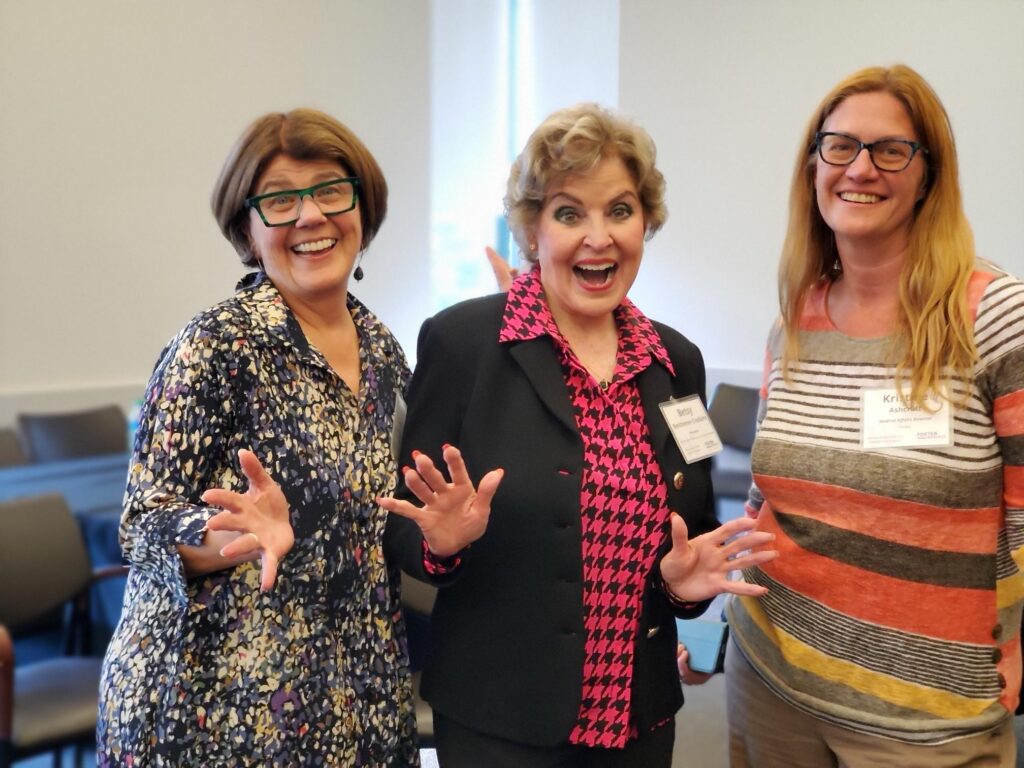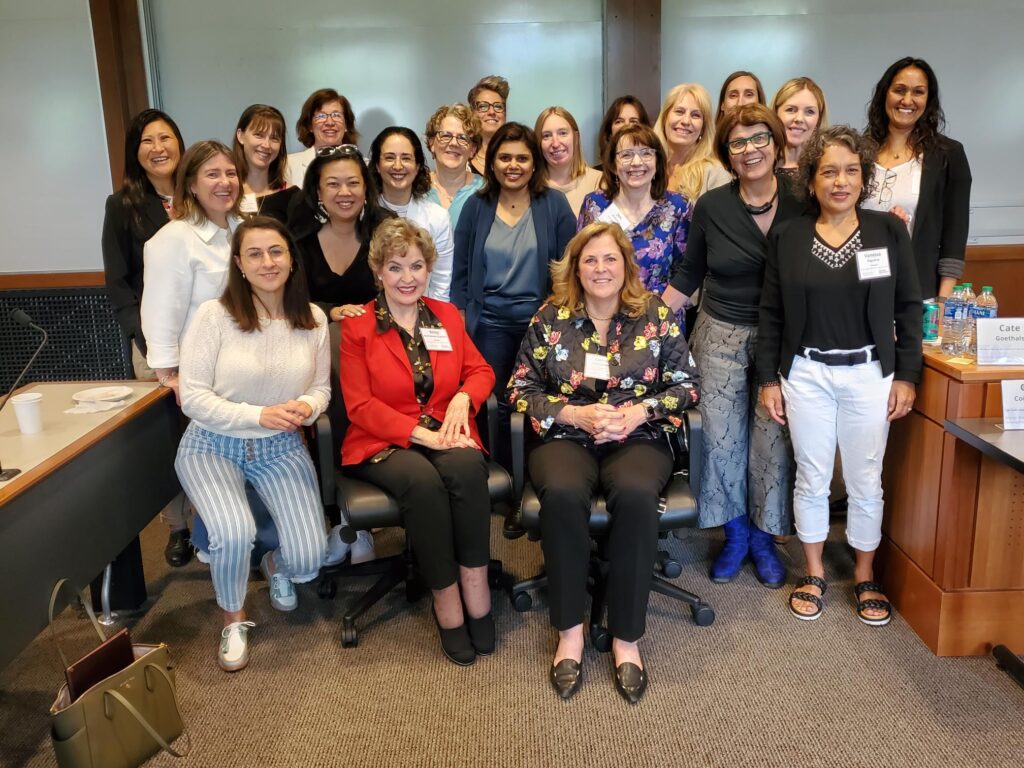Foster Marketing Faculty Spotlight – Cate Goethals
Get to know Cate Goethals – Affiliate Instructor of Marketing and International Business at the University of Washington’s Foster School of Business.

Cate pictured left
Please tell us a bit about your background.
I believe creativity thrives at the intersections of industries, professions, and cultures – and I like it best when I have my feet in different worlds. I have two passports, US and UK. My degrees outside of business (BA in Communications and MFA in Creative Writing) give me an additional perspective. I love art and literary fiction and The Arts and travel…but I also love business. My mother was a concert violinist and my father co-owned a foundry in the Midwest. If I get too practical, my artsy side protests; if I get too artsy, my practical side isn’t happy. All of this means I feel an especial affinity for MBAs from a creative or liberal arts background – and also for those from other countries. I ran programs all over India for 10 years, so those from the vibrant and energetic culture of the Subcontinent occupy a particular piece of my heart.
Above all, I’m passionate about the power of women leaders to make the world a better place. We sorely need parity at the top of our companies and institutions to create a different kind of future for our society and planet. At Foster, I’ve created multiple classes to embolden and empower underrepresented students. Back in 2005, I heard from many MBAs that they longed to see female CEOs to inspire them, so I created what is now MGMT 575 Women at the Top – five female CEO speakers for five weeks in a row, all sharing about their lives as a whole in a very personal way. The goal was and is to show that there are many routes for women to the C-Suite, some of them unconventional. The challenge for MBA women was and is to double down on their own individual strengths and values to find their own path.
There are now many more cool women in the C-Suite than when I created the course, but the diverse pathways still require resolve and support and sponsorship and self-knowledge. BA 575 provides a safe space for discussion and reflection.
Other courses I have designed include an undergrad class called Women in Leadership and two India programs, one of which still runs for MBAs in partnership with the amazing Self-Employed Women’s Association in Ahmedabad. In 2015, I created Foster’s Women Board Director Development Program based upon my research investigating the particular value women bring to boards of directors. That program now has more than 400 grads, many of whom are on corporate boards.
What are some of your research interests?
Most recently, a partner and I interviewed 103 corporate directors to suss out best practices and success factors for diverse boards of directors. Although the research overwhelmingly shows that diverse boards are associated with better business results, many boards are still working out the best ways to evolve…and many more directors than in the past have never served on a board before. There’s a learning curve.
Which factors influenced your decision to join UW Foster?
Foster is an amazing place full of amazing students. It’s a privilege to teach here.
What do you find meaningful about your time thus far at Foster?
I love seeing students realize how capable they are and to watch them reach for more – and then achieve it. It’s been gratifying to watch the proportion of women grow.
How have you worked to make your classroom/course curriculum inclusive?
This has happened naturally – so many more male MBAs now are determined to be allies.

Any favorite memories from your experience with Full-Time MBAs/Evening MBAs?
Many of my favorite memories involve traveling to India with MBAs to work with the wonderful Self-Employed Women’s Association (SEVA). The MBAs brought their energy and business skills to this world-class group of underserved women…and the SEWA group members taught the MBAs what they don’t always learn in the classroom; what it is like to build a business despite a lack of resources and support, how jugaad works, how to succeed at the bottom of the pyramid, the deep importance of basic respect and kindness.
One funny story was when a group of MBAs and I were with the Self-Employed Women’s Association in India in Ahmedabad. SEWA was hosting sister organizations from all over South Asia. On this particular evening, there was a women’s group visiting from Bhutan. The Indian women performed a Gujarati dance for us and then the Bhutanese women did a folk dance and sang a song from their country. They then turned to us and asked us to perform a folk dance or sing a song from our country. We were completely flummoxed by this request. The MBAs then came up with two solutions. For a dance, we all stood in a circle and performed “The Wave.” Our song? “Take Me out to the Ballgame.”
How have you supported students outside the classroom?
MBA students have contributed in significant ways to my research on boards of directors and women in leadership…and thus gained valuable knowledge. I have also worked with several students on independent studies; one student created the first case study for my women board directors class.
Are you currently doing work outside of Foster that influences what happens in the classroom?
I’m an executive coach working with what I call “women on the cusp” – clients who are going for something greater – a board seat, a higher position, a more meaningful life. Women at the Top students are also “on the cusp” so I offer a short coaching session as part of the class. I learn a lot from my clients. The concerns of the senior women I work with in my own practice and through the Athena Alliance (www.athenaalliance.com) help shape the topics of in-class discussions.
Are there components of your elective that can help students build their resume? E.g., experiential learning components?
Women at the Top students are required to reach out to at least one new mentor/sponsor. This is an important skill. Often they will say, “but I already have one appointed by my company.” To which I say, “great, find another anyway.” The skill is not in just having a mentor but in identifying who to reach out to and in taking the initiative to build a relationship with them. Often these conversations lead to sponsorship and career opportunities.
Any tips for incoming MBAs on how they can brush up on skills/knowledge over the summer?
Read any of the books on my syllabus. Challenge yourself to “use your student card” to set up conversations with people in your field as a learner. Build relationships before you contact them about a job.
Please tell us briefly about the structure of your course – what can students expect to learn by the end of it?
Students will complete a series of exercises to assess their strengths, take stock of their values, write a short leadership autobiography, examine the sponsorship genealogy of their careers, and create a short and longer term vision for their best possible lives. By the end, they should have more clarity and self-knowledge.
